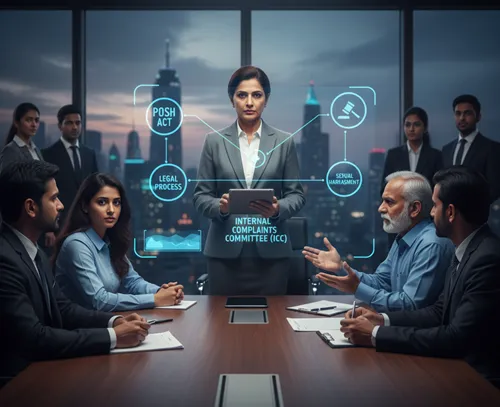Workplace Harassment: POSH Act Guide

The Prevention of Sexual Harassment (POSH) Act, 2013, protects women from sexual harassment at all workplaces — offices, factories, schools, hospitals, shops, and government departments, and even during work-related travel.
Who Is Covered?
- Permanent or temporary employees
- Contractual workers, consultants
- Interns, trainees, volunteers
- Visitors or clients present at the workplace
What Counts as Sexual Harassment?
- Unwanted physical contact or advances
- Requests or demands for sexual favours
- Sexually coloured remarks or jokes
- Displaying sexual content
- Any act that makes the workplace intimidating, hostile, or unsafe
Employer Responsibilities
- Establish an Internal Complaints Committee (ICC) for workplaces with ≥10 employees
- Display POSH Act details and complaint procedures
- Organise awareness/training programmes.
- Act promptly on complaints
How to File a Complaint
- Written Complaint: Submit to ICC within 3 months of the incident
- Inquiry: ICC conducts inquiry and submits report within 90 days
- Action: If harassment is proven, the employer may warn, suspend, terminate, or impose compensation on the perpetrator
Penalties for Non-Compliance
- Fine up to ₹50,000
- Heavier fine for repeated violations
- Possible cancellation of business licence
FAQs – POSH Act Simplified
-
What is the POSH Act?
-
Law to protect women from sexual harassment at workplaces.
-
Who can file a complaint?
-
Any woman employee, intern, trainee, visitor, or client facing harassment.
-
Does it apply to men?
-
No. Men may be covered by internal policies, not POSH.
-
What counts as harassment?
-
Physical advances, sexual remarks, requests for favours, and an unsafe environment.
-
What is ICC?
-
The Internal Complaints Committee is to receive and investigate complaints.
-
Who are ICC members?
-
Senior woman employee (presiding), 2 other employees, 1 external member (NGO/legal).
-
Time to file a complaint?
-
Within 3 months, extendable to 6 months for valid reasons.
-
Can a complaint be verbal?
-
Must be written; ICC helps draft if complainant cannot write.
-
What happens after filing?
-
Inquiry, evidence collection, hearings, report within 90 days.
-
What if harassment is proven?
-
Warning, suspension, termination, or compensation may be imposed.
-
Can I request leave/transfer during an inquiry?
-
Yes, ICC can recommend a temporary transfer or paid leave (≤3 months).
-
Workplaces with fewer than 10 employees?
-
File with the Local Complaints Committee (LCC) at the district level.
-
Is POSH training mandatory?
-
Yes, for all employees and ICC members.
-
Employer ignores complaint?
-
Fine up to ₹50,000; heavier penalties for repeated non-compliance.
-
Is remote work/online harassment covered?
-
Yes, it includes harassment via calls, emails, and chats.
-
Can a criminal case be filed?
-
Yes, independent of the POSH complaint; criminal action is possible.
-
False complaint?
-
ICC can act against the complainant if knowingly false.
-
Confidentiality?
-
Both parties' identities must be kept confidential by law.
-
House help coverage?
-
Yes, one can file a complaint with LCC.
-
No ICC in the organisation?
-
The employer is violating the law; penalties and licence cancellation are possible.
Add new comment